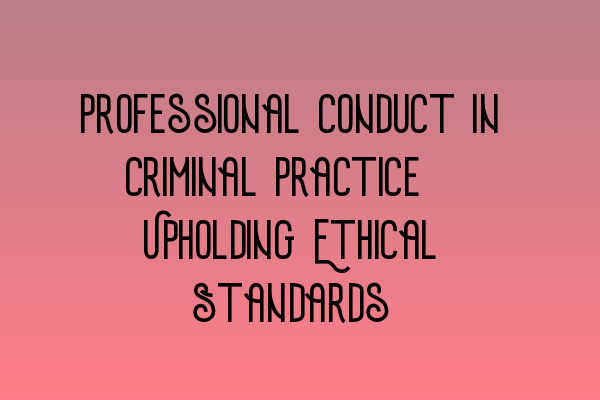Professional Conduct in Criminal Practice: Upholding Ethical Standards
As a solicitor specializing in Criminal Law & Practice, it is of utmost importance to always uphold ethical standards. When representing clients in legal matters, maintaining professional conduct is crucial to not only protect the rights and interests of your clients but also to preserve the integrity of the legal profession.
The Role of Professional Conduct
Professional conduct encompasses a set of ethical guidelines that guide lawyers in their interactions with clients, colleagues, and the judicial system. Adhering to these standards ensures that lawyers act in the best interests of justice, always maintaining their credibility and reliability.
In the context of criminal practice, the professional conduct rules are designed to safeguard the rights of the accused, maintain the fairness of legal proceedings, and ensure the legitimacy of the justice system. These rules dictate the responsibilities and obligations that lawyers must fulfill when representing clients in criminal cases.
Key Ethical Principles
Several key ethical principles form the foundation of professional conduct in criminal practice:
- Confidentiality: Lawyers must maintain client confidentiality at all times to foster trust and protect privileged information.
- Conflict of Interest: Lawyers must avoid any conflict of interest that may compromise their ability to provide unbiased representation.
- Honesty and Integrity: Lawyers must always be truthful and act with integrity in their dealings with clients, colleagues, and the court.
- Competence: Lawyers must possess the necessary knowledge and skills to provide competent representation to their clients. Regular professional development and staying updated with changes in criminal law are essential.
- Respect for the Rule of Law: Lawyers must uphold the rule of law and promote access to justice for all individuals, regardless of their background.
Impacts of Violating Professional Conduct
Failure to adhere to professional conduct standards can have severe consequences. It can not only harm your reputation as a solicitor but also lead to disciplinary action, including suspension or disbarment. Moreover, breaching ethical standards can undermine the credibility of the justice system and compromise the rights of your clients.
Importance of Continuous Professional Development (CPD)
Keeping up with the ever-changing legal landscape is crucial for maintaining ethical standards in criminal practice. Continuous Professional Development (CPD) is a vital aspect of a lawyer’s career, allowing them to enhance their skills, stay informed about legal developments, and ensure they provide the best possible representation to their clients.
At SQE Criminal Law & Practice Law UK, we offer a wide range of SQE 1 and SQE 2 preparation courses to help solicitors stay up-to-date with the latest legal knowledge and practice. Our SQE 1 Practice Exam Questions and SQE 1 Practice Mocks FLK1 FLK2 resources are designed to test your understanding and ensure you are well-prepared for the SQE 1 exams. For those preparing for the SQE 2 exams, our comprehensive SQE 2 Preparation Courses provide the necessary knowledge and skills to excel in your criminal practice.
Conclusion
Upholding ethical standards is paramount in criminal law practice. By adhering to professional conduct rules, solicitors can ensure the fair administration of justice, protect their clients’ rights, and preserve the integrity of the legal profession as a whole. Continuous professional development, such as our SQE 1 and SQE 2 preparation courses, plays an essential role in equipping lawyers with the knowledge and skills needed for ethical and competent representation.
For more information on the upcoming SRA SQE exam dates and how to prepare for the SQE 1 exams, please visit our SRA SQE Exam Dates and SQE 1 Preparation Courses pages.
